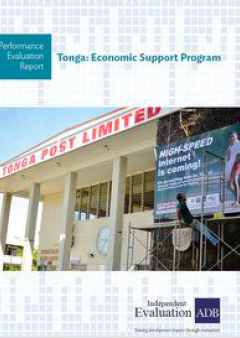
Tonga: Economic Support Program
The effects of the global economic crisis persisted and were not contained and fiscal position continued to be in deficit. A weak fiscal position could lead to difficulties in maintaining budgetary outlays and service standards on the outer islands. In hindsight, the selected package of reform measures was not the best option. Stronger reform measures such as those involving public-private partnership arrangements and other options to enhance private participation could have been explored. Also, more meaningful efforts for fiscal consolidation could have been pursued. Overall, the program is assessed less than successful, based on the non-attainment of both the program's impact and outcome targets.
As inputs to future operations in Tonga, the evaluation suggests the conduct of country and sector diagnostic studies to ascertain the most critical constraints. Past and current policy-based programs for Tonga have been largely focused on public financial management, fiscal consolidation, and public sector enterprise reforms. ADB could consider examining the country's binding constraints to growth and assess whether there are other areas where ADB could make more meaningful contributions. Likewise, ADB could provide support in identifying and monitoring vulnerable groups. It is important to know who the vulnerable groups are and understand how they respond and cope with external shocks and crisis conditions. This will facilitate better ways of reaching them with needed social services.
